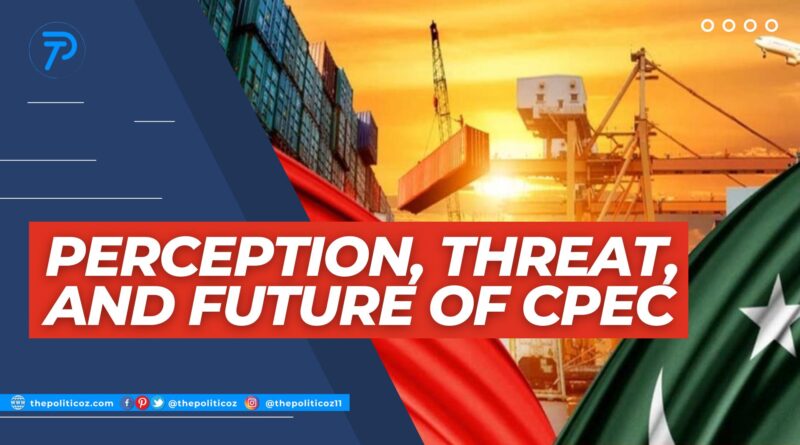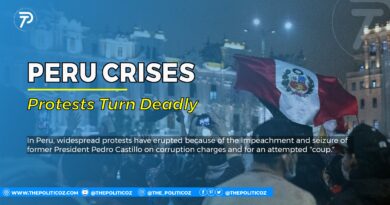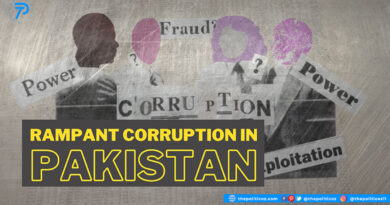Perception, Threat, and Future of CPEC
Perception, Threat, and Future of CPEC
The twenty-first century has witnessed a power shift from west to east. Talking about the future without China is an incomplete discussion. Simultaneously, in current times, mentioning the China-Pakistan Economic Corridor (CPEC) and One Belt One Road (OBOR) is worthwhile in discussing global politics and economic growth. The CPEC is part of the grand strategy of China’s One Belt One Road (OBOR) mega development project that aims to expand its economic and trade relations with various states and regions of the world. Though it is not a goal of China’s global domination, it provides an opportunity for nations with economic growth to strengthen their trade ties and maintain cordial relations with the world’s significant power China. It would connect over 60 Asian countries, Africa, and Europe continents through a revival of the old silk route. It is a flagship of the 21st Century Maritime Silk Road and Central Asian Silk Road. The expansion of Chinese economic, trade, and political interest in the regions would decrease the influence of the US in the world, especially in the Middle East and Asia. CPEC would support Chinese claims in the area. CPEC is a part of fifteen years of China’s plan. Wang Yi, the foreign minister of China, stated that OBOR is a sweet melody for an opportunity to other countries, and CPEC is its first movement of sweet melody. Currently, China seems to be one of the world’s most attractive countries, and CPEC is great hope for a better future and economic growth.
Pakistan faces significant domestic and external challenges that create hindrances in the progress of Pakistan and threats to CPEC.
To successfully implement CPEC projects, the Apex committees are set up to discuss, investigate and explore the solutions pertinent to implementing projects with foolproof security. Apex committees are working with sincere hearts, which is why their role is highly appreciated. Apex committees have proved more potential and effective than the provincial and federal governments. In addition, apex committees frequently meet compared to local and national governments.
Moreover, the role of the military is influential in apex committees. It is, however, coordination of civil and military in apex committees. Nonetheless, civil-military relation has remained a matter of discussion in the history of Pakistan since its inception, but today civil and military seems to be on the same page. Their cooperation, coordination, and closeness generate new hopes for a better Pakistan. The chief objective of the apex committees is to look after all matters about the CPEC projects to ensure successful implementations. The perception regarding apex committees has become very positive among people. They expect positive and fruitful results from their plans, policies, and actions.
Additionally, to meet security challenges and crush out the terrorist outfits, various operations have been conducted by different chiefs of army staff. At a significant level, insecurity and insurgency are de-escalated through these military operations. Indeed, China demands to maintain security within the state and fully understands the importance of the military role in Pakistan.
India, on its part, believes CPEC is a threat. However, China has repeatedly uttered that its intentions are not aggressive and establishing a military basis, but its actions are purely defensive to the region’s advantage. Despite explanations, India is explicitly worried about the increasing role of China in the area. At the same time, the United States is also concerned and trying to contain the power of China through India in the region and beyond. Besides, Japan, Australia, the USA, and India collectively play the role of containment of China through sea lanes. Some concrete indications have appeared regarding the involvement of foreign intelligence agencies in spying against the CPEC projects. It is widely reported that the Indian intelligence agency RAW has set up a unique desk to look after and deal with matters related to CPEC. RAW is extensively involved in spying and training certain elements to sabotage projects. India provokes the people of Pakistan against CPEC. Recently, in April 2018, it was reported that India had sent hundreds of persons to Afghanistan to train them against CPEC that would carry out attacks on projects. China chose to trade with regions of the world through Gwadar (Pakistan) because it had to find an alternative to the Malacca Strait. It is believed that around 80% of oil is imported to China through Malacca Strait, and if it is blocked anytime will bring havoc for China. Therefore, Gwadar is the best option for China to travel worldwide for trade and economy. The containment of China is a daydream because China is swiftly progressing in terms of economic and military. Its focus on military muscles and strengthening financial teeth concerns USA supremacy. CPEC will eventually provide China with access to the Indian Ocean. The Chinese presence in the Indian Ocean will create a challenge to the USA’s influence and India in the region of Asia.
For Pakistan, CPEC is an opportunity and offers economic and strategic benefits. More excellent investment in energy, infrastructure and industrial sectors would benefit Pakistan. It is expected that a considerable number of jobs will be generated through projects to help reduce poverty and insurgency in the state. Poverty and joblessness are core causes of terrorism and insurgency; therefore, CPEC will reduce terrorism at large. The future of Pakistan-China relations is bright and beneficial. For the last seventy-plus years, despite changes in the world, regional crises, conflicts, and skirmishes, China-Pakistan relations have remained unaffected; that is why China and Pakistan are called all-weather friends.
The Flagship project, China Pakistan Economic Corridor (CPEC), is a testimony to China-Pakistan relations that are described as “sweeter than honey,” higher than the Himalayas and more profound than oceans.
Imran Ali Noonari | Assistant Professor at University of Sindh, Jamshoro




